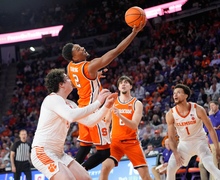Bethel: Clothing brands influence young females by placing reckless messages on apparel
Teenagers have always relied heavily on social trends and what’s popular to determine what clothes they should wear, with whom they should be friends and how they should behave.
To be different is to be socially inapt.
This aspect of our young culture merely points out the teenage need to conform to norms to feel relevant. But certain brands, such as Urban Outfitters and Abercrombie & Fitch, are beginning to inadvertently influence younger female teenagers with the messages given through some of their products.
As girls begin to stray away from the middle school era of innocence, they enter a stage in which maturity takes a drastic jump. Suddenly, the overly trendy Abercrombie polo shirt is met with a reckless message plastered across the chest of an edgy graphic T-shirt.
How is this a problem? It wouldn’t be if the latter message only resonated with an audience old enough to understand that the shirt holds no real significance. But instead, this seemingly harmless Urban Outfitters type of fashion is leaving a lasting impression on an audience too young.
With quotes displayed on their products like the one mentioned above, there is no misunderstanding the message young females are trying to get across about themselves.
The issue? Both college and middle-to-high school demographics shop at the same stores, and both are interpreting the message in completely different ways.
The “I Vote For Vodka” is one of countless controversially printed tees sold at Urban Outfitters.
College students see a shirt with the message “I Vote For Vodka” as humorous, and perhaps the perfect complement to a concert on campus. High school students see this shirt as “cool,” and a representation of something they aspire to be like.
Most college students and young adults do not associate their clothing with projecting a specific message to those around them — they have grown out of the fear of not being accepted by others.
But in high school, reputation and status generally hold a much greater importance. For females, especially, shopping is based on how their purchases will be socially perceived by their peers.
The ease at which teenagers indulge in these brands shows their attentiveness to the adult culture around them. Recently, Kitson LA teamed up with designer Brian Lichtenberg to create a clothing line called the “designer drugs collection.” The shirts resemble sports jerseys and display the name of a prescription drug on the back. In a press release following the lines reveal, Lichtenberg defended the collection by describing it as “a parody of pop culture.”
At about the same time, Urban Outfitters began selling a shirt that had “Eat Less” written in cursive across the front. Online, the description underneath said “Eat less or more or however much you’d like…”
Both of these instances resulted in serious controversy within the media, causing celebrities and concerned parents alike to retaliate against the messages the companies were too bluntly condoning.
This struggle between far and too far is quickly becoming a trend of its own in today’s popular culture. Companies are constantly pushing the content of their products to levels that cross serious boundaries.
Whether a clothing company decides to reflect their views of society onto their merchandise, using drug abuse and eating disorders as a way to sell a product should not be tolerated.
The media has made it easier than ever for young people to mimic what they see as trendy in our society. Mainstream companies like Urban Outfitters need to be careful with what they put out. It’s not just the college demographic that is cashing in on the image they are selling.
Paris Bethel is a junior advertising major. Her column appears weekly. She can be reached at pbethel@syr.edu.
Published on September 28, 2013 at 7:05 pm





